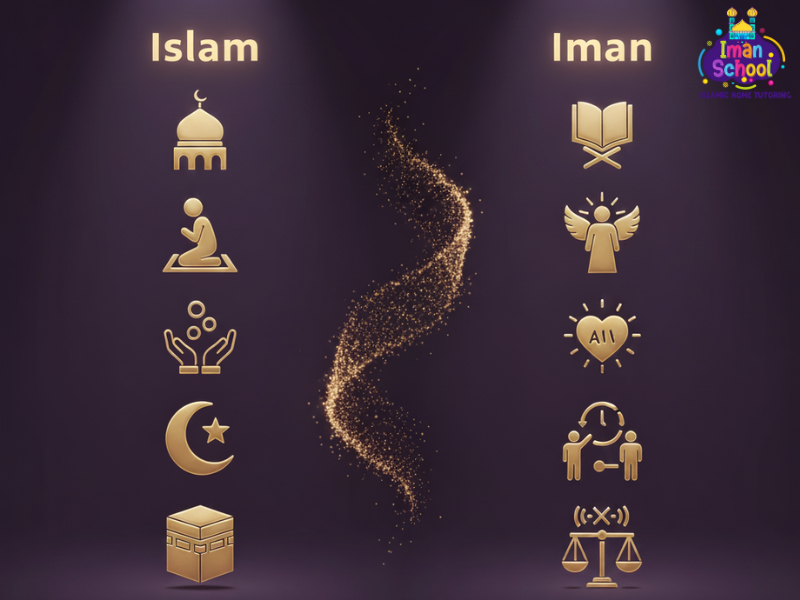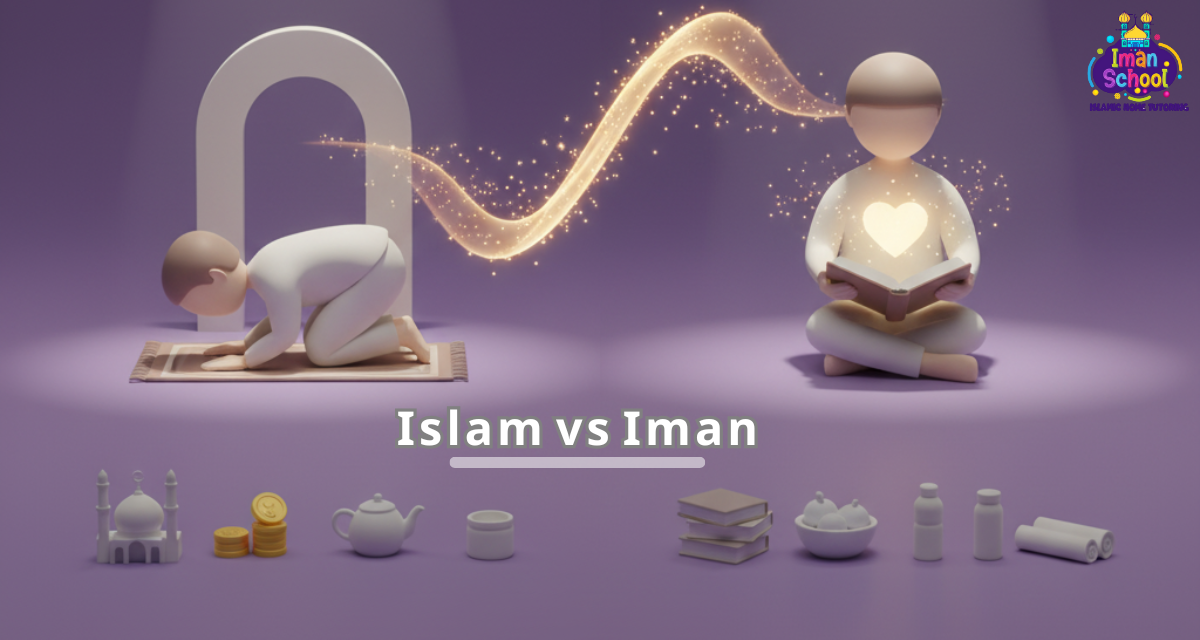Understanding the difference between Islam and Iman is fundamental to grasping the core of Islamic theology, or Aqeedah. While often used interchangeably in everyday language, these two terms represent distinct yet interconnected levels of faith and practice. For anyone seeking to delve deeper into basic tenets of Islam or learn Islamic theology online, clarifying the difference between Islam and Iman is the essential starting point.
What is Islam and What is Iman?
The simplest way to understand the difference between Islam and Iman is to distinguish between outward action and inward conviction.
Islam (The Outward Submission)
Literally means "submission to the will of Allah." Islam pertains to the visible actions and practices of a Muslim. It is the practical application of faith, demonstrated through deeds, rituals, and adherence to the Divine Law (Sharia).
Iman (The Inward Conviction)
Literally means "faith" or "belief." Iman is the inward state of the heart—the firm, unwavering conviction in the unseen realities revealed by Allah and His Messenger (peace be upon him). It is the source of all good deeds.
The meaning of Iman and Islam is that Islam is the body of the religion, while Iman is its soul.

The Quran and Sunnah on Islam vs. Iman
The Quran and Sunnah clearly delineate the difference between Islam and Iman, often showing that Iman is a prerequisite for true Islam.
Evidence from the Quran
In Surah Al-Hujurat, Allah addresses a group of desert Arabs who claimed to be believers:
“The Arabs of the desert say, ‘We believe.’ Say to them, ‘You have not believed yet; rather, say, 'We submit,' for the faith (Iman) has not yet entered your hearts.” (Quran 49:14)
This verse establishes the difference between Islam and Iman: they achieved the outward state of Islam (submission) but had not yet attained the deeper, inner conviction of Iman.
Evidence from the Sunnah
The classic distinction is found in the famous Hadith of Jibreel (Gabriel), which details the Islam Iman Ihsan explained:
When Jibreel asked the Prophet Muhammad (PBUH) about Islam, the Prophet listed the pillars of Islam (prayer, fasting, zakat, etc.—all actions). When Jibreel asked about Iman, the Prophet listed the six articles of faith (belief in Allah, His angels, His books, etc.—all convictions of the heart).
This La Ilaha Illallah Hadith (in a broader context) outlines the pillars of Iman and the pillars of Islam separately, definitively establishing the difference between Islam and Iman.
The Five Pillars of Islam
These are the obligatory practical acts that constitute the framework of Islam (outward submission). Observing these pillars is mandatory for distinguishing a Muslim from others (including the difference between Kafir and Muslim).
-
Shahada: The declaration of faith (Tawhid and Iman).
-
Salat: The five daily ritual prayers.
-
Zakat: Obligatory charity.
-
Sawm: Fasting during the month of Ramadan.
-
Hajj: Pilgrimage to Mecca, required once in a lifetime for those who are able.
The Six Pillars of Iman
These are the unseen articles of faith that constitute the conviction of Iman (inward belief). They are the core intellectual requirements necessary for genuine understanding the Islamic creed (Aqeedah).
-
Belief in Allah (God).
-
Belief in His Angels.
-
Belief in His Revealed Books.
-
Belief in His Messengers.
-
Belief in the Last Day (Judgment Day).
-
Belief in Divine Decree (Qada' wal-Qadar), both good and bad.
Islam and Iman: The Analogy of the Body and Soul
The intricate relationship between the two concepts helps illustrate the difference between Islam and Iman.
-
Iman is the Soul: It is the inner belief, invisible but vital. Without the soul, the body is lifeless. Similarly, without Iman (sincere belief), one's Islam (actions) may be empty ritual, devoid of true spiritual reward.
-
Islam is the Body: It is the physical manifestation. The soul needs a body to express itself. Similarly, Iman must be expressed through the physical acts of Islam (prayer, fasting, etc.).
Therefore, Iman is necessary for Islam to be accepted, and Islam is the necessary manifestation of Iman.
Enroll in Our Aqeedah Course
To truly grasp the profound difference between Islam and Iman, a structured study of what is Aqeedah is necessary. For beginners and those interested in online Islamic studies, Iman School offers detailed courses on Islamic theology designed to clarify these foundational concepts.
Why Beginners Need to Understand Islam and Iman
For those new to the faith (Islam for converts and reverts) or those just starting their journey, understanding the difference between Islam and Iman is essential. It provides a foundational map for their practice: Iman tells them what to believe, and Islam tells them how to practice that belief.
Without this clear understanding, one cannot truly appreciate the depth of their faith. If you want to dive into Islamic fundamentals course, this distinction is the first lecture.

Get to know: Human Rights in Islam
The Fiqh of Faith: When Do Iman and Islam Overlap?
In Islamic jurisprudence (Fiqh), the difference between Islam and Iman often overlaps in two ways:
-
General Usage: When the words are used separately, they carry the distinct meanings outlined above.
-
Combined Usage: When only one word is used (e.g., "Iman"), it often implies the meaning of the other, encompassing the entirety of the religion. A perfect believer (Iman vs Islam) embodies both: the conviction of the heart and the outward practice of the limbs.
How to Strengthen Your Iman: Practical Steps
Understanding the difference between Islam and Iman naturally leads to the question of how to strengthen Iman. Since Iman resides in the heart, it is something that fluctuates and requires active maintenance.
-
Increase sincere reflection on the Quran.
-
Perform consistent, sincere prayer (Salat).
-
Seek beneficial knowledge (Tawhid and Iman).
-
Engage in the remembrance of Allah (Dhikr).
-
Reflect on the signs of Allah in the universe.
-
Keep company with righteous people.
-
Perform voluntary good deeds beyond the obligations.
-
Avoid sins and forbidden actions.
-
Make earnest Dua (supplication) to Allah.
-
Study the names and attributes of Allah.
Understanding Ihsan: The Highest Level of Faith
While Islam and Iman represent the foundation, Ihsan represents the pinnacle of faith. It is what is the highest level of faith in Islam. The Hadith of Jibreel defines Ihsan as:
"To worship Allah as if you see Him, for if you do not see Him, He surely sees you."
A person who achieves this level not only fulfills the pillars of Islam (Islam) and possesses firm belief (Iman), but performs all actions with perfect excellence, motivated by the consciousness of Allah's constant presence. This complete circle of Islam Iman Ihsan explained covers the entire religious life.
FAQ about Difference between Islam and Iman
What is the fundamental difference between Islam and Iman?
Islam refers to outward submission (actions and rituals like the pillars of Islam). Iman refers to inward conviction (belief in the unseen, like the pillars of Iman). Islam is the body; Iman is the soul.
What are the pillars of Iman?
There are six pillars of Iman: belief in Allah, His angels, His revealed books, His messengers, the Last Day, and Divine Decree. This belief is essential for Tawhid and Iman to be sound.
Can someone have Islam without Iman?
Yes, according to the Quran, a person can perform the outward acts of Islam without true belief entering the heart. This highlights the practical difference between Islam and Iman.
What is the highest level of faith after understanding the difference between Islam and Iman?
The highest level is Ihsan, which is the perfection of both belief and practice. This concept of Islam Iman Ihsan explained shows the complete religious journey.
Why is understanding the difference between Islam and Iman important for beginners?
It helps beginners grasp the basic tenets of Islam and realize that faith requires both inner conviction (Iman) and outward action (Islam). For deeper study, this distinction is key to understanding the Islamic creed (Aqeedah).
Online Courses on Islamic Creed (Aqeedah)
Ready to move beyond the surface and gain a scholarly understanding of the difference between Islam and Iman? Iman School—the best online Quran teaching academy—specializes in providing structured online Quran and Islamic courses for Western audiences.
We offer detailed programs in understanding the Islamic creed (Aqeedah), Fiqh, Sharia, Tafsir, and Islamic History.




